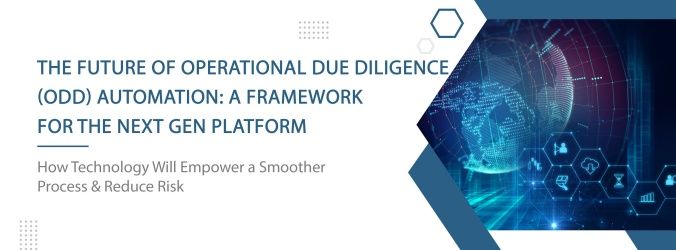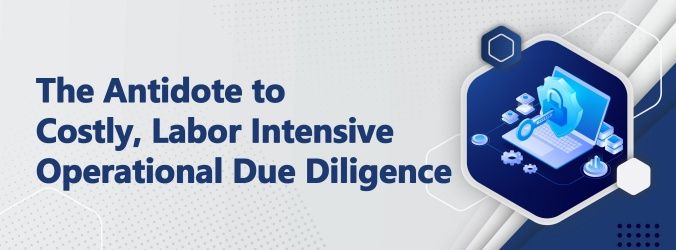How Operational Due Diligence Has Changed Forever

The post-pandemic “new normal” has created a shift across countless business processes. It’s become increasingly clear that remote work is here to stay, which is a fact investors, consultants, and fund managers must learn to accommodate. Since early 2020 we have been operating remotely. Operational due diligence continues to be as important as ever, so here are some of the ways it can be conducted from afar.
A Centralized Data Hub for ODD
Keeping all information about managers, funds, risk and related information in one place is essential to supplement your onsite visits. With a hybrid approach finding information in the cloud, in real-time, creates the opportunity for collaboration from anywhere. For example, rather than chasing down documents in disparate places, DDQs responses and all supporting information is a centralized repository, updated in real time as users update their responses digitally. With a single hub, locating information becomes quick and convenient—even when remote.
The right technology should let you manage all your funds and strategies data in a single place. It should empower your team to:
- Leverage a unified, 360 degree view of investment operations, with the ability to drill into the manager, fund or strategy level.
- Maintain all documents in a single library, and use powerful search capabilities within your documents and library.
- Collaborate more efficiently internally with comments & tagging options.
- Track what happened over time with a detailed audit trail for all communication.
- Easily import and export data.
The Value of Structured Data and Analytics
The need for actionable analytics has not dissipated – it’s more important than ever. Ideally, in a remote world, your team would have a solution in place that helps them deliver powerful insights regarding any aspect of the ODD process that stakeholders are interested in. On the analytics side, it’s important to map your DDQs to your manager database. This allows you to extract data and review it easily, or run benchmarks across all managers at a detailed level.
Dashboards within your platform can be helpful when pulling everything together. Consider scoring dashboards at the manager, fund, or strategy level. Use dashboards to track progress of DDQs, issues, and assignments. Drill down into the data and utilize any filtering capabilities available to you. Above all, you’ll have access to detailed analytics and reports that generate insights and highlight risks and exceptions.
Involving Internal Stakeholders in ODD
Connecting and collaborating with your internal investment team (portfolio managers, risk managers, key decision makers, etc.) is more important in a remote world. Keeping them up to date and aware of all processes can set you up for success. Having the items above - in particular, a centralized data hub that contains the most important data collected throughout the ODD process - is essential to providing transparency. This enables you to engage and involve your internal investment team more effectively by providing regular updates and showcasing progress within useful dashboards. A platform that allows your team to view and collaborate throughout the entire process, displaying issues and resolutions, can provide access without extra effort on your part.
DD360 is a multi-party operational due diligence platform used by investors and managers to provide a superior operational due diligence process experience. DD360 provides a highly intuitive user experience, deep automation, and analytics. Learn more about DD360 here.


